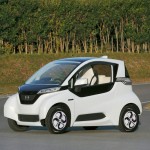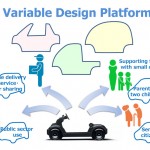In the pleasant city of Saitama in Japan, the vision of the future is nearly upon us with micro sized vehicles whizzing about the streets in whisper silence. Honda’s Micro Commuter Prototype β will begin real-world testing this autumn in the city after the Ministry of Land, Infrastructure, Transport and Tourism (MLIT) agreed the application by Saitama City’s council for promoting the use of micro-sized electric mobility products; or micro cars to you and I.
The purpose of the testing it to gather user data and look at traits and trends of how the micro cars are used within the City and of course, how well they cope. What’s more, the micro-ev will double up as a mini power supply to homes during testing and Honda’s hope is to see how well it performs this function too.
Before we get excited at the prospects of an electric Peel P50 with ‘Jetsons’ styling, Honda is aiming these micro-ev’s at senior citizens in particular, who often only need a vehicle for very short journeys. Parallels to France’s “sans-permis” (no licence required) micro cars may be drawn though it is safe to assume the micro-cars will require a licence until an announcement to the contrary is given.
Honda’s Micro Commuter Prototype β has been designed in accordance with regulations set by the MLIT and the European L7 category. This category is generally reserved for vehicles such as quad-bikes and is only applicable to vehicles weighing less than 400kg (excluding batteries) and having a power output of less than 15kW. In Europe, the classification is significant as it aims to bring down the number of accidents caused by users of motorcycles and tricycles due to their poor safety record. Renault’s Twizy is similar in concept to Honda’s Prototype β and was marketed at people seeking a safer alternative to a scooter.
Modular by design, Honda has plans to build the micro-ev’s in several different configurations as the construction allows for different body and interior designs to be bolted on with relative ease. For the initial testing in Saitama, Honda will supply their Prototype β in two seater mode, with one driver and one passenger.
Honda have expressed their desire to continue in the research of micro mobility as their statement reads,
“Striving to continue proposing next-generation mobility products, which expand the joy and fun of mobility while minimizing the environmental footprint as well as the most suitable city plans for each community, Honda will remain committed to proactive research and development of such technologies and products.”
AutoVolt Magazine posted the full press release of the original Honda Micro Commuter Prototype, which you can read here.
Source; Honda


